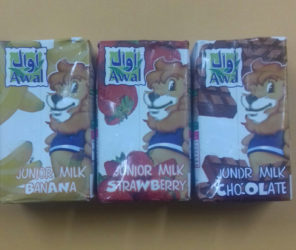A shipment containing over 7,000 cases of milk imported from the Kingdom of Bahrain located in the Persian Gulf was denied entry into Guyana by the Government Analyst-Food and Drug Department (GA-FDD) after it was found that it was adulterated with vegetable oil.
The announcement was made yesterday via a press release in which the Department advised importers to seek approval first before shipping products that are new to the Guyana market.
The release stated that one 20 foot container containing 7,200 cases each containing 24 boxes of 125 ml Awal Junior Milk in Strawberry, Banana and Chocolate –flavours was denied entry.
It was stated that samples of the milk were submitted to the Department for examination on December 22, 2016 and it was revealed that the milk was adulterated with vegetable oil and contained 1.5 % milk fat and not the recommended 2 .5 % milk fat in accordance with the provisions for “Flavoured Milk” as prescribed for in the Food and Drug Regulations – Division Five (5) Dairy Products, Regulation 12.

This is also prohibited according to the Laws of Guyana Food and Drug Act Chapter 34:04 Part II Section 7 on food standard, the release said.
It was explained that “consent to grant entry of the product into Guyana for consumers to use, particularly children, was not granted.” It was stated that as prescribed in Part 1(Administration) of the Food and Drug Regulations, the Head of the Customs Department and the importer were officially notified of the Department’s decision based on the inspectors’ report.
Members of the National Food Safety and Control Committee that comprises representatives, inspectors from the Surveillance Unit, Ministry of Public Health (MoPH Veterinary Public Health Unit, Environmental Health Unit and Environmental Officers), inspectors from the ten administrative regions and inspectors from City Council and regional municipalities, would be apprised on the Department’s action at the National Food Safety and Control Committee Meeting scheduled for today. This is being done to ensure this product is not circulated.
“The Department is advising all importers to ensure written approval is obtained from the department prior to the introduction of any new foods, drugs, cosmetics and/or medical devices as is required according to the Food and Drug Act chapter 34:03 Section 22 (II) and (Ill) and Section 32 (II) and also the Food and Drug Regulations, regulations 11, 12 &13,” the release said.
It added that the Department will continue to work with all stakeholders to ensure substandard items of foods, drugs cosmetics and medical devices are prevented from being released on our local market for use by consumers.
Within the last year, the Department has denied entry of several milk-based shipments. Last February, the Department announced that four shipments were denied because they were non- complaint with the prescribed standard.
Two of the importers subsequently moved to the courts to challenge the Department’s decision but lost.
The first case involved a container of condensed milk that was imported from Malaysia. The shipment arrived in Guyana in December 2015. Chief Justice (ag) Yonette Cummings-Edwards ruled last November ruled that the GA-FDD had provided sufficient evidence to support its decision to deny entry. An appeal has since been filed to challenge that ruling.
The second case involved a container of ‘sweetened condensed milk’ that arrived in Guyana on February. The originating country was not made public. The CJ made a similar ruling like in the first case and an appeal has already been filed to challenge it.
Cole, in his review of last year, had told this newspaper that the Department will be working on developing capacity to ensure that it can do the fatty acid profiling of milk. “We have to get our equipment up and running in the earliest possible time because in the past, milk came to Guyana adulterated with palm oil,” he had said. He added that it could be possible that such milk was coming to Guyana and this information was being withheld (from the labelling). He made mention of the two condensed milk cases that the Department won in the High Court and pointed out that milk with a fat other than milk fat “is considered adulterated in the Food and Drug Act and Regulations.”





